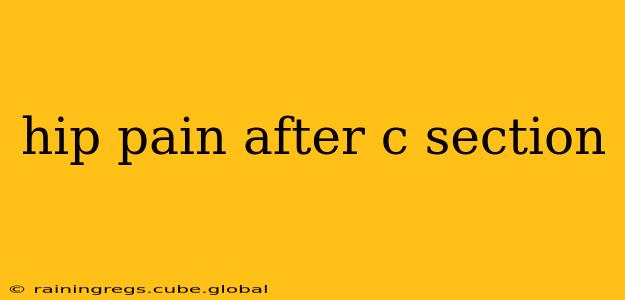Experiencing hip pain after a cesarean section (C-section) is more common than you might think. Many new mothers focus on the recovery from the abdominal incision, but the impact on the hips and surrounding areas often gets overlooked. This comprehensive guide explores the potential causes of this pain, effective treatment options, and preventive measures to help you regain comfort and mobility.
What Causes Hip Pain After a C-Section?
Several factors can contribute to hip pain following a C-section. It's not always a single cause; often, it's a combination of factors that contribute to the discomfort.
-
Hormonal Changes: Pregnancy and childbirth significantly alter hormone levels. Relaxin, a hormone responsible for softening ligaments and joints in preparation for labor and delivery, can linger after birth, potentially leading to joint instability and pain in the hips.
-
Postural Changes: Carrying extra weight during pregnancy, coupled with the altered center of gravity, can strain the hip joints. This strain can be exacerbated after the C-section as mothers adjust to postpartum life and potentially limit their movement due to pain or discomfort.
-
Muscle Weakness and Imbalance: The abdominal muscles are weakened during pregnancy and further stressed during the C-section procedure. This weakness can lead to compensatory strain on the hips and surrounding muscles, resulting in pain.
-
Inadequate Support: Lack of proper support during pregnancy and postpartum can contribute to hip pain. This includes insufficient pelvic support, resulting in instability and strain on the hip joints.
Is Hip Pain After C-Section Normal?
While some degree of discomfort is expected after a major surgery like a C-section, persistent or severe hip pain is not considered normal. It's crucial to consult your doctor or healthcare provider if you experience significant hip pain that interferes with your daily activities or worsens over time. They can properly diagnose the cause and recommend appropriate treatment.
How Long Does Hip Pain After a C-Section Last?
The duration of hip pain after a C-section varies greatly depending on the individual, underlying causes, and treatment received. For many women, the pain gradually subsides within a few weeks to months. However, for others, it may persist longer, requiring more extensive treatment. Consistency with prescribed exercises and pain management strategies is key to minimizing the duration.
How to Treat Hip Pain After a C-Section?
Treatment options for hip pain after a C-section range from conservative measures to more intensive interventions. Your healthcare provider will recommend the most appropriate approach based on your specific situation.
-
Over-the-counter pain relievers: Ibuprofen or acetaminophen can help manage mild to moderate pain.
-
Physical therapy: A physical therapist can guide you through exercises to strengthen weakened muscles, improve joint mobility, and enhance posture. This is often a highly effective treatment method.
-
Rest and elevation: Allowing your body ample time to heal is crucial. Rest when you need to and elevate your legs to reduce swelling and pain.
-
Heat and cold therapy: Applying heat or cold packs to the affected area can provide temporary pain relief. Experiment to find what works best for you.
-
Chiropractic care: In some cases, chiropractic adjustments may help realign the pelvis and relieve hip pain.
-
Prescription medication: If over-the-counter pain relievers are insufficient, your doctor might prescribe stronger pain medication.
How Can I Prevent Hip Pain After a C-Section?
While not all instances of hip pain are preventable, proactive measures can significantly reduce your risk.
-
Maintain a healthy weight: A healthy weight before and during pregnancy reduces stress on your joints.
-
Engage in regular exercise: Prenatal and postpartum exercises, such as pelvic floor exercises and low-impact cardiovascular activity, strengthen muscles and improve posture. Always consult your doctor before starting any new exercise routine.
-
Maintain good posture: Practicing good posture throughout pregnancy and postpartum can minimize strain on the hips and lower back.
-
Wear supportive clothing: Proper support garments, such as supportive underwear or a belly band, can provide added stability.
Can a C-Section Cause Long-Term Hip Problems?
While most women recover fully from C-section-related hip pain, in some cases, the pain can become chronic. This is more likely if underlying conditions or untreated injuries contribute to the problem. If you experience persistent hip pain, seeking professional medical attention is essential to rule out any long-term issues.
This information is intended for general knowledge and informational purposes only, and does not constitute medical advice. It is essential to consult with a healthcare professional for any health concerns or before making any decisions related to your health or treatment.
